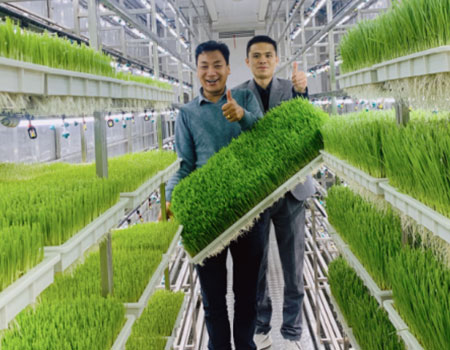Planting vegetables on the balcony has become a new way of life for urbanites. Picking and planting organic fruits and vegetables by hand every day has realized the idyllic dream of every urbanite. Some overseas urban residents in Chengdu grow their own vegetables through "private gardens". Family balcony planting vegetables is particularly common in Singapore, Hong Kong, Taiwan and Japan. Free vegetable planting can be realized without watering and fertilizing. The 10-square-meter balcony can harvest 30 kinds of vegetables all year round. This is a very new family planting method. Let's have a look!
The well-known vegetable planting method is soil planting, but soil planting has many limitations, such as soil quality is not suitable for vegetable planting, limited land area can not be planted in large areas, or weather problems will affect the yield of vegetables. So the method of hydroponic cultivation of vegetables came into being.The hydroponic vegetable planting system is the best choice to save water and soil resources.

At present, there are two kinds of common hydroponic vegetables, one is fruit vegetables, the other is leafy vegetables, tomatoes, fruit cucumbers, etc., scallions, cabbages, lettuce, coriander, etc. Different vegetables can be planted in different seasons. The leafy vegetables can be planted all year round from January to December. With different fruit and vegetables, you can eat different vegetables every day. You can plant vegetables on a small balcony. The space is properly used, so that thousands of families can eat without worrying.
The vegetable hydroponic system has two advantages: saving water resources and land resources.
In the process of agricultural production in China, in order to prevent diseases and insect pests and other problems from affecting the output of agricultural products, a large number of pesticides are generally used, not only in large amounts, but also in complex types of pesticides. The excessive use of pesticides will not only directly pollute the soil environment, but also form residues on crops, threatening the health of the people.In addition, in order to increase the output of agricultural products, a large number of chemical fertilizer products are used, and the nitrate and phosphate components in the chemical fertilizer will not only accumulate in the soil to pollute the soil environment, but also cause serious pollution to the natural water body and affect the soil quality.

Hydroponic vegetables directly provide nutrition and water for roots through nutrient solution, so the nutrient supply of vegetables is more sufficient, balanced and rapid. The yield of vegetables grown in this way is several times or even more than ten times higher than that of traditional soil cultivation.
The planting of traditional agriculture relies too much on the use of chemical fertilizers, pesticides and plastic films, resulting in a series of vicious cycle problems such as water pollution, white pollution, soil hardening, and the resurgence of pests after the emergence of drug resistance. To solve these problems, we must vigorously develop ecological agriculture. The planting environment of hydroponic vegetables can effectively alleviate the problems of pesticide residues, heavy metal pollution, land, water and air pollution, and is currently the most valuable ecological agriculture.









